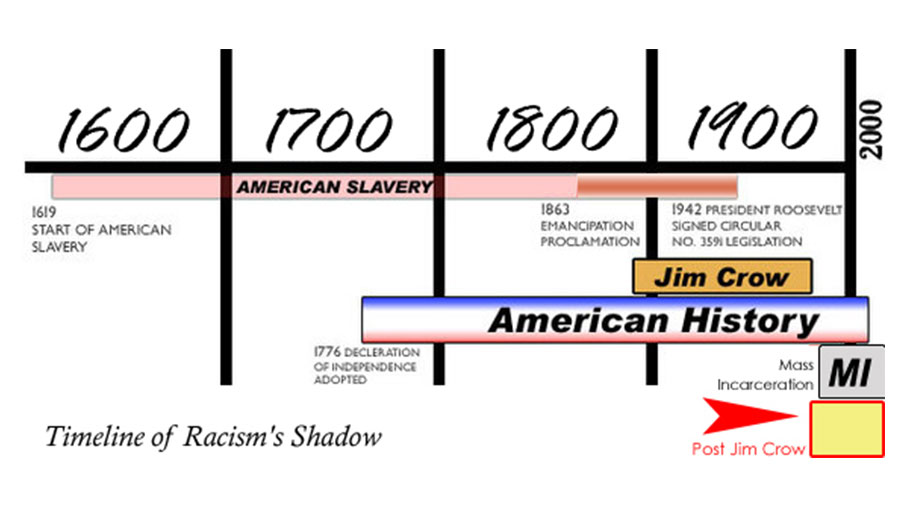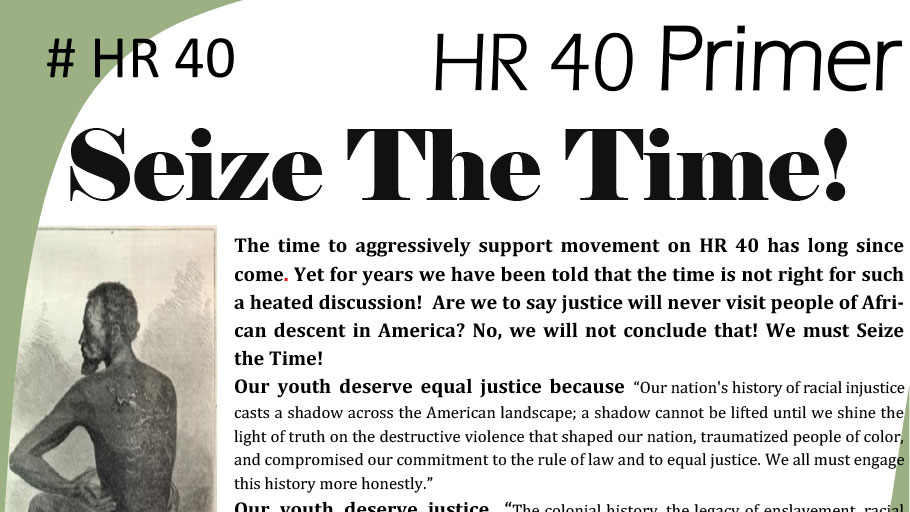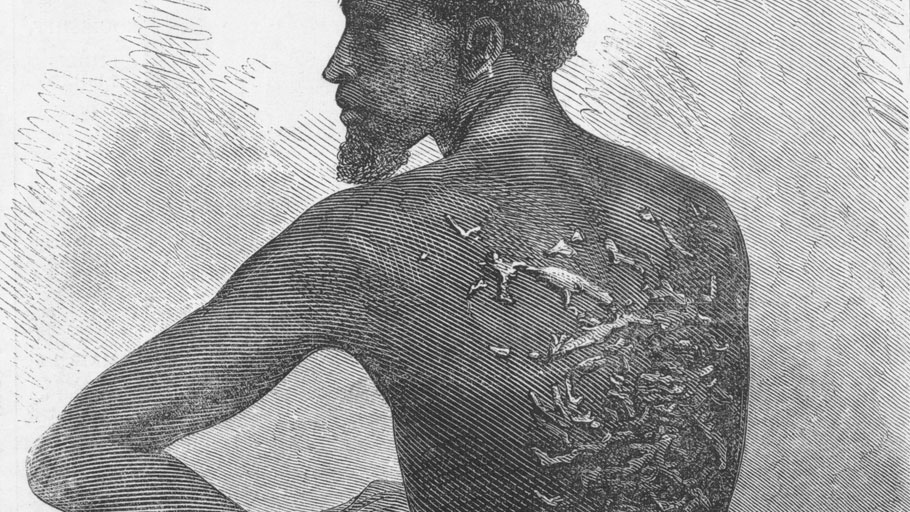By N’COBRA —
The HR 40 Primer was produced by the National Coalition of Blacks for Reparations in America (N’COBRA) with information, assistance, and inspiration of the National African American Reparations Commission (NAARC), #40 Acres and More Reparations Strategy Group, and the Black Is Back Coalition (BIBC) for Social Justice, Peace and Reparations.
Contents
- Seize The Time!
- A New HR 40
- Rationale for Revising HR 40
- What is New With HR 40 ?
- Forms Reparations Can Take
- Current Co-Sponsors
- HR 40 – Full Text
- Sistah’s Statement
- Download HR 40 Primer (PDF)
Seize The Time!
The time to aggressively support movement on HR 40 has long since come. Yet for years we have been told that the time is not right for such a heated discussion! Are we to say justice will never visit people of African descent in America? No, we will not conclude that! We must Seize the Time!
Our youth deserve equal justice because “Our nation’s history of racial injustice casts a shadow across the American landscape; a shadow cannot be lifted until we shine the light of truth on the destructive violence that shaped our nation, traumatized people of color, and compromised our commitment to the rule of law and to equal justice. We all must engage this history more honestly.”
Our youth deserve justice… “The colonial history, the legacy of enslavement, racial subordination and segregation, racial terrorism and racial inequality in the U.S. remains a serious challenge as there has been no real commitment to reparations and to truth and reconciliation for people of African descent.”
Our youth deserve justice… The dehumanizing behavior, the atrocities and terrorism of enslavement in the U.S. were not isolated occurrences but constitutionally authorized by the government of the United States of America.
Our youth deserve justice… Yesterday’s convict leasing, debtor’s prison, and lynching reinforced a narrative of racial difference and a legacy of racial inequality and terror that is readily apparent in our criminal justice system today. A system that disparately impacts our youth! Mass incarceration, racially biased capital punishment, excessive sentencing, disproportionate sentencing of racial minorities, and police abuse of people of African descent reveal problems in American society that were shaped by the terror era yet prevail even today. Such behavior profoundly impacted race relations in this country and shaped the contemporary geographic, political, social, and economic conditions of African Americans. Our youth deserve better and we must ask your assistance and support!!
Our youth deserve economic justice… If current economic trends continue, the average black household will need 228 years to accumulate as much wealth as their white counterparts hold today or in other words the white counterpart must stand still for 228 years and allow for the leveling of the playing field. Absent significant policy interventions, or a seismic change in the American economy, people of African descent will never close the gap. Given the current climate this gap stands to expand exponentially in a short period of time.
Our youth deserve full access to social rights and human rights… Successive administrations, including the present one, have determinedly rejected the idea that economic and social rights are full-fledged human rights, despite their clear recognition not only in key treaties that the United States has ratified but in the Universal Declaration of Human Rights which the US has long insisted other countries must respect.
2001 Durban World Conference Against Racism declared
“Slavery was a crime against humanity”
Durban 400 – 2018, and the vestiges continue to this day!
A New HR 40
On January 3, 2017, at the opening of the 115th Congress of the United States, Cong. John Conyers introduced a revised HR 40 bill. The previous version was first introduced in 1989 and was historically referred to as the “Reparations Study Bill.” The new HR 40 is now being referred to as the “Reparations Remedy Bill”.
Rationale for Revising HR 40
At the inaugural meeting of the National African American Reparations Commission NAARC (2015), it was determined that much of what the original HR40 was designed to do had already been done. Specifically, to determine if there were continued harms on current people of African descent in America from the crimes of enslavement and Jim Crow segregation. Since it was concluded that there were, it was determined by the NAARC commissioners that HR 40 be revised and be presented to Cong. John Conyers. Cong. Conyers accepted NAARC’s revisions an introduced the new bill on January 3, 2017 at the start of the 115th Congress. Below is NAARC’s full Rationale and Preamble for Affirming the New HR40
The National African American Reparations Commission’s Rationale and Preamble for Affirming the New HR-40: the Commission to Study and Develop Reparations Proposals and Processes Act
The 1989 issuance of HR-40 continues to be a prophetic pronouncement of what the United States of America must do to address its Achilles heel of systemic racism that continues to haunt and undermine the nation’s entire psycho-social, political, religious and economic fabric and future. The bill is an attempt to address the undeniable reality that to achieve equality and to end racial injustice we must acknowledge and materially address past, and continuing, harms. Without addressing the accumulated result of past harms we are destined to recreate them. Notwithstanding the reinvented, unabated and increased evidences of an urgent transgenerational racial divide, HR – 40 has been ignored, denied and rendered irrelevant by all but a few members of the U.S. Congress.
However, despite the lack of passage of the HR-40 Bill by the U.S. Congress over the past 27 years , HR-40 propelled the local, national and international academic and NGO communities, and in some cases, governmental bodies to assume its charges. The result has been a large corpus of information to effect the goals of the proposed Bill documenting the institution of slavery, its aftermath and the impact of its forces on living African Americans. In particular, and specifically, the following developments asserts the need and rationale for the revised HR-40 that focuses on, and emphasizes, remedy or reparation proposals, programs, policies, processes and initiatives:
- That a compendium of research on reparations has been mounting – books like Randall Robinson’s, The Debt: What America Owes to Blacks (2000), Dr. Ray Winbush’s, Should America Pay?: Slavery and the Raging Debate on Reparations (2003) , the comprehensive reader, Redress for Historical Injustices in the United States, by Michael T. Martin and Marilyn Yaquinto, and the international law assessment, Slavery Reparations Time Is Now: Exposing Lies, Claiming Justice for Global Survival (2013), by Nora Wittmann. In addition numerous other journal contributions and publications like to the 2015 essay by Ta Nehesi Coates, entitled “A Case for Reparations,” (The Atlantic) and, “Retracing Slavery’s Trail of Tears (Smithsonian Magazine) by Edward Ball all have amounted to exceptional research in the area of continued injury and need for reparative justice. We can also add, Ebony and Ivy: Race, Slavery and the Troubled History of America’s Universities (Craig S. Wilder), Complicity: How the North Promoted, Prolonged, and Profited from Slavery (Anne Farrow and Joel Lang). Slavery By Another Name: The Re-enslavement of Black Americans from the Civil War to world War II ( Douglass Blackmon), The Half Has Never Been Told: Slavery and the Making of American Capitalism (Edward Baptist), Ava DuVernay’s documentary, 13th, and a great deal of other well researched scholarship on slavery and segregation’s harms and legacy.
- That in the early 2000’s “an unprecedented number of reparations lawsuits and legislative initiatives” had been filed in various courts in the US seeking reparatory justice from the acts of enslavement and Jim Crow segregation. Suits filed by Omari Obadele even sited the 13th and 14th Amendment as being injurious and in violation of the human right of a people to self-determine their political destiny, as well as the 15th Amendment equal protection clause has never been applied, as the “principle of consistency” has never been observed regarding the race of African descendants, thereby prolonging the negative legacy of enslavement and injury to future generations. In the 2002-2003, suits were on file in Illinois, Texas, New York, New Jersey, Louisiana, California and Oklahoma. Many of these were consolidated in 2005 before a court in the Northern District of Illinois, whereby in dismissing the claim, the Judge ruled that redress should be resolved by Congress or the executive branch.
- That there have been numerous states that have sought to aid in the reparations movement by enacting legislation requiring corporations and institutions to disclose their or their predecessor entities’ enslavement ties. California, Massachusetts, Chicago, Milwaukee, Philadelphia are just a few of the state and local governments that passed slavery disclosure legislation, as disclosure and accounting have been the seminal steps in formulating reparative justice initiatives.
- That Congressional apologies for the enslavement and racial discrimination of people of African descent were enacted by the US House of Representatives in 2006 and by the US Senate in 2008. Where both apologies noted that as a result of slavery, followed by, Jim Crow segregation, racism was enmeshed in the social fabric of America in every area of life for people of African descent, whereby the vestiges of slavery and Jim Crow continue to this day and that the suffering from these consequences are seen through enormous damage and loss, both tangible and intangible, including the loss of human dignity and liberty, the frustration of careers and professional lives, and the long-term loss of income and opportunity;;
- That the Congressional apologies cited the acknowledgement of Presidents Clinton and Bush — asserting that many of the issues that still trouble America and in particular, those resulting in the deep seated problems of African Americans have roots in the bitter experience and continued legacy of slavery, discrimination and racism.
- That the Congressional apologies noted that President Bush recommended America confront the negative legacy , that President Clinton began a national discussion on Race, and the House of Representatives apology expressed a commitment to rectify the lingering consequences of the crimes committed against African Americans under slavery and Jim Crow.
- That President Obama blamed the nation’s racial past, in his speech after the acquittal of Trayvon Martin’s killer, reminding America that much of the violence that takes place in poor black neighborhoods around the country is born out of a very violent past in this country, and that the poverty and dysfunction that we see in those communities can be traced to a very difficult history – enslavement and racial segregation and discrimination.
- That there were many past reparation actions in the US. From 1971 to 1986 six indigenous nations received some forms of reparations. In 1990 the Japanese received $1.2 billion. In 2011 there was another settlement to Native Americans and the following year reparations were paid to Black Farmers. And finally, last year the Obama administration paid reparations to Jewish Holocaust victims.
- That there are several international instruments and protocols that empower, and in some cases, mandate, Congress to legislate the repair of the African descendant community.
- That the Durban Declaration and Program of Action, emanating from the 2001 World Conference Against Racism, recognizing that people of African descent in the Americas were victims of slavery and the slave trade, and that these practices were appalling tragedies in the history of humanity not only because of their abhorrent barbarism but also in terms of their magnitude, organized nature and especially their negation of the essence of the victims, and further acknowledging that slavery and the slave trade are a crime against humanity and should always have been so; that racism and racial discrimination grew therefrom,, and the effects and persistence of these structures and practices have been among the factors contributing to lasting social and economic inequalities, whereby people of African descent continue to be victims of the consequences of that history; that there is moral obligation on the States to take appropriate and effective measures to halt and reverse the lasting consequences of those practices including providing avenues for just and adequate reparation.
- That the International Covenant for Civil and Political Rights (ICCPR), the ICCPR’s– differentiating article 27, spells out a special unique relationship of the state to its national minorities from immigrant minorities and subgroup minorities. Only Native Americans, African Descendants and Chicanos are national minorities in this country. (All other minorities are either subgroup or immigrant minorities.)
- That the United Nations Declaration on the Rights of Minorities. Defining national minorities as having a unique characteristic in that they were within the national boundaries at the time a nation was formed and that they had a significant role in the formation of the nation. In addition to Native Americans, Africans in America, and those Hispanics who self-define as Chicanos (their land annexed to America in the Mexican American War) share this status. In 1776 there were 500,000 Africans in America who accounted for 20% of the population. As such, this government has a special and legal obligation to positively legislate policy effecting people of African descent distinctively separate from sub-group minorities and immigrant minorities in America.
- That the International Covenant for the Elimination of Racism (ICERD) incorporates the Durban Declaration and Program of Action in relation to people of African descent and spells out the mandate and scope of special measures that must be created to repair the harms to people of African descent.
- That the International Law Commission and the Basic Principles and Guidelines on the Right to a Remedy and Reparation for Victims of Gross Violations of International Human Rights Law and Serious Violations of International Humanitarian Law both spells out what is considered full reparations. Understanding that full reparations must wipe out “all consequences” of the crime and abuse. Full reparations has five major components: cessation, restitution, compensation, satisfaction, and rehabilitation.
- That on December 23, 2013 the United Nations General Assembly declared January 1, 2015 to December 31, 2024 to be the International Decade of People of African Descent, understanding that although many efforts and initiatives undertaken by States to prohibit discrimination and segregation and to engender the full enjoyment of economic, social and cultural as well as civil and political rights, millions of human beings continue to be victims of racism and discrimination, both direct and indirect, de facto and de jure, and they continue to manifest themselves in inequality and disadvantage. And that the Decade provides a solid framework for States to take effective measures in the areas of recognition, justice and development for people of African descent.
- That the United Nations Working Group of Experts for People of African Descent, in concluding their 2016 United States visit, stated that there is a profound need to acknowledge in the United States that the transatlantic slave trade was a crime against humanity and among the major sources and manifestations of racism, racial discrimination, xenophobia and related intolerance and that Africans and people of African descent were victims of these acts and that African Americans continue to be victims of their consequences; and that these past injustices and crimes against African Americans need to be addressed with reparatory justice.
Further, the relevance and necessity of HR-40 is affirmed by the recent emergence of the Movement for Black Lives which centered the demand for reparations in its policy platform while Black Youth Project 100, as well as other groups, sought attention and remedy at the UN, with the claim “We charge genocide.” This accusatory claim from this generation’s movement is akin to the declaration from other generations’ claims in 1951 and again in 199?, affirming the continuity of legitimate grievances borne by African Americans for which this nation must ultimately redress/atone.
HR-40, a bill re-entitled “Commission to Study and Develop Reparation Proposals/Processes for African Americans Act”, represents the unfulfilled imperative that the United States of America, as a nation state, document, acknowledge, and make amends for its state sponsored participation in the transatlantic slave trade and the continuing legacy of egregious acts of inhumanity, discrimination and racial apartheid inflicted upon people of African descent in this country. HR-40 is situated more propitiously now than ever in light of the UN declaration of the Decade of People of African Descent (2015-2025) and the recent September 2016 report of the UN Working Group of Experts for People of African Descent.
The National African American Reparations Commission (NAARC), an extension of a global network of people of African ancestry who are committed to GLOBAL REPATORY JUSTICE, herein affirms the foundational role and relevance of HR-40. The issuance of NAARC’s recent request to the Obama administration for an Executive Order to establish a reparatory justice commission titled “The John Hope Franklin Presidential Initiative and Commission on Reparatory Justice for People of African Descent in America (African Americans),” directly and indirectly embodies the demands of HR-40 in six critical key ways:
- There is an unconscionable denial and lack of knowledge in this nation about the true nature, facts and consequences of the transatlantic slave trade and enslavement of African peoples upon which American “democracy,” prosperity and white privilege and hegemony are founded.
- The current period of intentional revisionism and erasure of this history and role of the slave trade system and its consequences in building this nation have become entrenched in significant ways that impact today’s the curriculums and educational infrastructure at all levels, from K-university
- The growing transgenerational psycho social trauma of internalized oppression upon African American individuals, families and communities has been largely ignored and has monumental consequences on the health and wellbeing of African Americans.
- It is impossible to achieve equality or to end racial injustice without acknowledging and materially addressing past, and continuing, harms. Reform without reparations ignores the substantive reality that Black communities are starting from a 250 year deficit of wealth, opportunity and access.
- Despite the myopic lens of America, the global dimension of these issues are being manifested and organized by the exigencies of an African world view of these claims, the geopolitical realities of a global economy and the UN declaration of the Decade of People of African Descent.
- The transgenerational urgency of reparatory justice for redress regarding these matters will continue to deepen and forge new global alliances that are restructuring societies around the world and compromise the efficacy of U.S. domestic and foreign policy.
In light of the above, HR-40 B demands an apology and calls for appropriate repair of the damage/reparatory justice/reparations ……

2014-06-19-RacismTimeline. Huffington Post
1619 –2018 Racialized terror, abuse, exploitation, oppression and theft (plunder) have all resulted in the post and present traumatic condition in African Descendants in America that is evident in the economic deterioration social and educational decline, political and cultural disorder within our communities that demands reparatory justice.
What is New with HR 40?
On Jan 3, 2017, Cong John Conyers, introduced a revised, new HR 40. There are two major emphasis’s of the new bill. In addition to studying the history and legacy of the crimes against African humanity during the colonial, enslavement, Jim Crow periods, it looks to also examine the post Jim Crow period and the current harms that continue to this day.
Secondly, it charges the Commissioners to craft remedies that address the multifaceted harms of these crimes in comport with “full reparations” as understood by international norms of reparations.
NCOBRA Outline of the Intended Outcomes of HR 40
Areas of Study
- Colonial America — Capture and Procurement, Transport, Sale and Acquisition as Property, Treatment, Extensive Denial of Humanity, Obstructions in Demand to Return, Role Colonial Governments played
- Institution of enslavement — Capture and procurement, Transport, Sale and Acquisition as property, Treatment. Extensive denial of humanity, Obstructions in demand to Return, Role State and Federal Governments played
- Continued discrimation, exploitation, terror and abuse post enslavement to the present — Treatment, Continued denial of humanity, Terrorist entities, Role of Fed and State gov.
- The lingering negative effects
- The manner in which texts and the digital instruction is used to deny the crimes
- Northern complicity
- Benefit to public and private institutions, – religious, corporate and higher-learning
Recommendations for Remedy
- Appropriate ways to inform the public
- Develop Remedies for harms determined
- Must “comport with international standards of remedy for wrongs and injuries caused by the State, that include full reparations and special measures, as understood by various relevant international protocols, laws, and findings.”
Range of Remedies to be Developed
- Cessation and guarantees of non-repetition – How Federal and state laws and policies that continue to disproportionately and negatively affect African-Americans as a group, and those that perpetuate the lingering effects, materially and psycho-social, can be eliminated.
- Restitution – How the injuries resulting from matters described [from findings] can be reversed and provide appropriate policies, programs, projects and recommendations for the purpose of reversing the injuries.
- Compensation – How, in consideration of the Commission’s findings, any form of compensation to the descendants of enslaved African is calculated. What form of compensation should be awarded, through what instrumentalities and who should be eligible for such compensation.
- Satisfaction – How the Government of the United States will offer a formal apology on behalf of the people of the United States for the perpetration of gross human rights violations and crimes against humanity on African slaves and their descendants.
- Rehabilitation – How, in consideration of the Commission’s findings, any other forms of rehabilitation to African descendants is warranted and what the form and scope of those measures should take.
Forms Reparations Can Take
Under the international concepts of “full reparations” and “special measures,” reparations must “wipe out all consequences” of the harm and “include the full span of legislative, executive, administrative, budgetary and regulatory instruments, at every level in the State apparatus … “
Reparations as …
Forms of reparations that are in bold font are demands within the National African American Reparations Commission’s 10-Point Reparations Plan
Cessation and Guarantees of Non Repetition
- Release of all Black political prisoners who fought against criminal and discriminatory practices of the government
- Repeal the “except” clause in the 13th Amendment to the Constitution
- Enact civilian police accountability councils that are representative of the people
- Dismantle entire Criminal Injustice System with its host of 21st century “Black Codes”
Restitution
- The Right of Repatriation and Creation of an African Knowledge Program
- Repairing the Damages of the “ Criminal Injustice System”
- Strengthening Black America’s Information and Communications Infrastructure
- Education for Community Development and Empowerment
- Restitution for stolen land, intellectual property and artistic creations.
- Fund programs that reincorporate Black men into productive life countering the many wars waged on black masculinity
Compensation
- The Right to Land for Social and Economic Development
- Funds for Cooperative Enterprises and Socially Responsible Entrepreneurial Development
- Affordable Housing for Healthy Black Communities and Wealth Generation
- Tax exemption status
- Individual payments for inherited injury and theft of inheritance
Satisfaction
- A Formal Apology and Establishment of a MAAFA/African Holocaust Institute
- Preserving Black Sacred Sites and Monuments
- Acknowledge right to self-determination
Rehabilitation
- Resources for the Health, Wellness and Healing of Black Families and Communities
- Establish a African-centered institute to research and counter the effects of transgenerational epigenetic health challenges
Current Co-Sponsors of HR 40
Currently there are 32 Co-sponsors of HR40,. This number needs to be at near 100 to move this legislation forward. With 20+ members of the Congressional Black Caucus yet to sign, and many members in the Hispanic, Asian and Progressive Caucuses that may lend support, we are certain that if we SEIZE THE TIME we can reach our numbers and get HR40 moving thorough the legislative process!
Congressional Black Caucus and Progressive Caucus Members in Support of Hr 40: the Commission to Study and Develelop Reparations Proposals for African Americans Act
On January3, 2017, Cong John Conyers, of Michigan, introduced a revised version of HR 40. The new bill focuses on reparations remedies in full comport with international standards of reparations. The Commission will be charged to assemble historical and current data and findings on the continued injuries resulting from the enslavement, racial terror, segregation and discrimination of African Americans. In addition, the Commission will charged with developing policies targeted actions to repair the injuries. These reparative initiatives will have the aims of cessation and guarantees of non-repetition, restitution, compensation, satisfaction and rehabilitation – as determined by international norms of full reparations. 17 Congress members stood in support of introducing the revised HR40. (Original Co-sponsors) Since that time, 15 have been added.
We applaud each of them for their courage and correct stand for reparatory justice!!!
Original Co-Sponsors
- Joyce Beatty OH
- William Lacy Clay MO
- Steve Cohen TN
- Elijah Cummings MD
- Danny Davis IL
- Keith Ellison MN
- Al Green TX
- Luis Gutierrez IL
- Alcee Hastings FL
- Barbara Lee CA
- Sheila Jackson Lee TX
- John Lewis GA
- Gregory Meeks NY
- Jerrold Nadler NY
- E. Holmes-Norton DC
- Jan Schakowsky IL
- Jose Serrano NY
- Robert Brady NY
- Bobby Rush IL
- E. Bernice-Johnson TX
- G.K.Butterfield NC
- Sandford Bishop Jr GA
- Cedric Richmond LA
- Bennie Thompson MS
- Gwen Moore WI
- Terri Sewell AL
- Fredrica Wilson FL
- Brenda Lawrence MI
- Yvette Clarke NY
- Pramila Jayapal WA
- Karen Bass CA
- Donald Payne NJ
- Ro Khanna CA
H. R. 40 Full Text
Introduced at the 115th Congress, Jan 3, 2017
To address the fundamental injustice, cruelty, brutality, and inhumanity of slavery in the United States and the 13 American colonies between 1619 and 1865 and to establish a commission to study and consider a national apology and proposal for reparations for the institution of slavery, its subsequent de jure and de facto racial and economic discrimination against African-Americans, and the impact of these forces on living African-Americans, to make recommendations to the Congress on appropriate remedies, and for other purposes.
IN THE HOUSE OF REPRESENTATIVES
January 3, 2017
Mr. Conyers (for himself, Mr. Serrano, Mr. Al Green of Texas, Ms. Norton, Mr. Hastings, Mr. Ellison, Mrs. Beatty, Mr. Lewis of Georgia, Mr. Nadler, Mr. Danny K. Davis of Illinois, Mr. Clay, Mr. Gutiérrez, Mr. Cohen, Mr. Cummings, Mr. Meeks, Ms. Schakowsky, Ms. Jackson Lee, and Ms. Lee) introduced the following bill; which was referred to the Committee on the Judiciary
A BILL
To address the fundamental injustice, cruelty, brutality, and inhumanity of slavery in the United States and the 13 American colonies between 1619 and 1865 and to establish a commission to study and consider a national apology and proposal for reparations for the institution of slavery, its subsequent de jure and de facto racial and economic discrimination against African-Americans, and the impact of these forces on living African-Americans, to make recommendations to the Congress on appropriate remedies, and for other purposes.
Be it enacted by the Senate and House of Representatives of the United States of America in Congress assembled,
SECTION 1. SHORT TITLE.
This Act may be cited as the “Commission to Study and Develop Reparation Proposals for African-Americans Act”.
SEC. 2. FINDINGS AND PURPOSE.
(a) Findings.—The Congress finds that—
- approximately 4,000,000 Africans and their descendants were enslaved in the United States and colonies that became the United States from 1619 to 1865;
- the institution of slavery was constitutionally and statutorily sanctioned by the Government of the United States from 1789 through 1865;
- the slavery that flourished in the United States constituted an immoral and inhumane deprivation of Africans’ life, liberty, African citizenship rights, and cultural heritage, and denied them the fruits of their own labor;
- a preponderance of scholarly, legal, community evidentiary documentation and popular culture markers constitute the basis for inquiry into the on-going effects of the institution of slavery and its legacy of persistent systemic structures of discrimination on living African Americans and society in the United States; and
- following the abolition of slavery the United States Government, at the Federal, State, and local level, continued to perpetuate, condone and often profit from practices that continued to brutalize and disadvantage African-Americans, including share cropping, convict leasing, Jim Crow, redlining, unequal education, and disproportionate treatment at the hands of the criminal justice system; and
- (as a result of the historic and continued discrimination, African-Americans continue to suffer debilitating economic, educational, and health hardships including but not limited to; having nearly 1,000,000 Black people incarcerated; an unemployment rate more than twice the current White unemployment rate; and an average of less than 1⁄16 of the wealth of White families, a disparity which has worsened, not Improved over time.
(b) Purpose.—The purpose of this Act is to establish a commission to study and develop Reparation proposals for African-Americans as a result of—
- the institution of slavery, including both the Trans-Atlantic and the domestic “trade” which existed from 1565 in colonial Florida and from 1619 through 1865 within the other colonies that became the United States, and which included the Federal and State governments which constitutionally and statutorily supported the institution of slavery
- the de jure and de facto discrimination against freed slaves and their descendants from the end of the Civil War to the present, including economic, political, educational, and social discrimination;
- the lingering negative effects of the institution of slavery and the discrimination described in paragraphs (1) and (2) on living African-Americans and on society in the United States;
- the manner in which textual and digital instructional resources and technologies are being used to deny the inhumanity of slavery and the crime against humanity of people of African descent in the United States;
- the role of Northern complicity in the Southern based institution of slavery;
- the direct benefits to societal institutions, public and private, including higher education, corporations, religious and associational;
- and thus, recommend appropriate ways to educate the American public of the Commission’s findings;
- and thus, recommend appropriate remedies in consideration of the Commission’s findings on the matters described in paragraphs (1), (2), (3), (4), (5), and (6); and
- submit to the Congress the results of such examination, together with such recommendations.
SEC. 3. ESTABLISHMENT AND DUTIES.
(a) Establishment.—There is established the Commission to Study and Develop Reparation Proposals for African-Americans (hereinafter in this Act referred to as the “Commission”).
(b) Duties.—The Commission shall perform the following duties:
-
- (Identify, compile and synthesize the relevant corpus of evidentiary documentation of the institution of slavery which existed within the United States and the colonies that became the United States from 1619 through 1865. The Commission’s documentation and examination shall include but not be limited to the facts related to—
(A) the capture and procurement of Africans;
(B) the transport of Africans to the United States and the colonies that became the United States for the purpose of enslavement, including their treatment during transport;
(C) the sale and acquisition of Africans as chattel property in interstate and intrastate commerce;
(D) the treatment of African slaves in the colonies and the United States, including the deprivation of their freedom, exploitation of their labor, and destruction of their culture, language, religion, and families; and
(E) the extensive denial of humanity, sexual abuse and the chatellization of persons. - The role which the Federal and State governments of the United States supported the institution of slavery in constitutional and statutory provisions, including the extent to which such governments prevented, opposed, or restricted efforts of formerly enslaved Africans and their descendants to repatriate to their homeland.
- The Federal and State laws that discriminated against formerly enslaved Africans and their descendents who were deemed United States citizens from 1868 to the present.
- The other forms of discrimination in the public and private sectors against freed African slaves and their descendents who were deemed United States citizens from 1868 to the present, including redlining, educational funding discrepancies, and predatory financial practices.
- The lingering negative effects of the institution of slavery and the matters described in paragraphs (1), (2), (3), (4), (5), and (6) on living African-Americans and on society in the United States.
- Recommend appropriate ways to educate the American public of the Commission’s findings.
- Recommend appropriate remedies in consideration of the Commission’s findings on the matters described in paragraphs (1), (2), (3), (4), (5), and (6). In making such recommendations, the Commission shall address among other issues, the following questions:
- (Identify, compile and synthesize the relevant corpus of evidentiary documentation of the institution of slavery which existed within the United States and the colonies that became the United States from 1619 through 1865. The Commission’s documentation and examination shall include but not be limited to the facts related to—
(A) How such recommendations comport with international standards of remedy for wrongs and injuries caused by the State, that include full reparations and special measures, as understood by various relevant international protocols, laws, and findings.
(B) How the Government of the United States will offer a formal apology on behalf of the people of the United States for the per petration of gross human rights violations and crimes against humanity on African slaves and their descendants.
(C) How Federal laws and policies that continue to disproportionately and negatively affect African-Americans as a group, and those that perpetuate the lingering effects, materially and psycho-social, can be eliminated.
(D) How the injuries resulting from matters described in paragraphs (1), (2), (3), (4), (5), and (6) can be reversed and provide appropriate policies, programs, projects and recommendations for the purpose of reversing the injuries.
(E) How, in consideration of the Commission’s findings, any form of compensation to the descendants of enslaved African is calculated.
(F) What form of compensation should be awarded, through what instrumentalities and who should be eligible for such compensation.
(G) How, in consideration of the Commission’s findings, any other forms of rehabilitation or restitution to African descendants is warranted and what the form and scope of those measures should take.
(c) Report To Congress.—The Commission shall submit a written report of its findings and recommendations to the Congress not later than the date which is one year after the date of the first meeting of the Commission held pursuant to section 4(c).
SEC. 4. MEMBERSHIP.
(a) Number And Appointment.—
- The Commission shall be composed of 13 members, who shall be appointed, within 90 days after the date of enactment of this Act, as follows:(A) Three members shall be appointed by the President.
(B) Three members shall be appointed by the Speaker of the House of Representatives.
(C) One member shall be appointed by the President pro tempore of the Senate.
(D) Six members shall be selected from the major civil society and reparations organizations that have historically championed the cause of reparatory justice. - All members of the Commission shall be persons who are especially qualified to serve on the Commission by virtue of their education, training, activism or experience, particularly in the field of African-American studies and reparatory justice.
(b) Terms.—The term of office for members shall be for the life of the Commission. A vacancy in the Commission shall not affect the powers of the Commission and shall be filled in the same manner in which the original appointment was made
(c) First Meeting.—The President shall call the first meeting of the Commission within 120 days after the date of the enactment of this Act or within 30 days after the date on which legislation is enacted making appropriations to carry out this Act, whichever date is later.
(d) Quorum.—Seven members of the Commission shall constitute a quorum, but a lesser number may hold hearings.
(e) Chair And Vice Chair.—The Commission shall elect a Chair and Vice Chair from among its members. The term of office of each shall be for the life of the Commission.
(f) Compensation.—
- Except as provided in paragraph (2), each member of the Commission shall receive compensation at the daily equivalent of the annual rate of basic pay payable for GS–18 of the General Schedule under section 5332 of title 5, United States Code, for each day, including travel time, during which he or she is engaged in the actual performance of duties vested in the Commission.
- A member of the Commission who is a full-time officer or employee of the United States or a Member of Congress shall receive no addition al pay, allowances, or benefits by reason of his or her service to the Commission.
- All members of the Commission shall be reimbursed for travel, subsistence, and other necessary expenses incurred by them in the performance of their duties to the extent authorized by chapter 57 of title 5, United States Code.
SEC. 5. POWERS OF THE COMMISSION.
(a) Hearings And Sessions.—The Commission may, for the purpose of carrying out the provisions of this Act, hold such hearings and sit and act at such times and at such places in the United States, and request the attendance and testimony of such witnesses and the production of such books, records, correspondence, memoranda, papers, and documents, as the Commission considers appropriate. The Commission may invoke the aid of an appropriate United States district court to require, by subpoena or otherwise, such attendance, testimony, or production.
(b) Powers Of Subcommittees And Members.—Any subcommittee or member of the Commission may, if authorized by the Commission, take any action which the Commission is authorized to take by this section.
(c) Obtaining Official Data.—The Commission may acquire directly from the head of any department, agency, or instrumentality of the executive branch of the Government, available information which the Commission considers useful in the discharge of its duties. All departments, agencies, and instrumentalities of the executive branch of the Government shall cooperate with the Commission with respect to such information and shall furnish all information requested by the Commission to the extent permitted by law.
SEC. 6. ADMINISTRATIVE PROVISIONS.
(a) Staff.—The Commission may, without regard to section 5311(b) of title 5, United States Code, appoint and fix the compensation of such personnel as the Commission considers appropriate.
(b) Applicability Of Certain Civil Service Laws.—The staff of the Commission may be appointed without regard to the provisions of title 5, United States Code, governing appointments in the competitive service, and without regard to the provisions of chapter 51 and subchapter III of chapter 53 of such title relating to classification and General Schedule pay rates, except that the compensation of any employee of the Commission may not exceed a rate equal to the annual rate of basic pay payable for GS–18 of the General Schedule under section 5332 of title 5, United States Code.
(c) Experts And Consultants.—The Commission may procure the services of experts and consultants in accordance with the provisions of section 3109(b) of title 5, United States Code, but at rates for individuals not to exceed the daily equivalent of the highest rate payable under section 5332 of such title.
(d) Administrative Support Services.—The Commission may enter into agreements with the Administrator of General Services for procurement of financial and administrative services necessary for the discharge of the duties of the Commission. Payment for such services shall be made by reimbursement from funds of the Commission in such amounts as may be agreed upon by the Chairman of the Commission and the Administrator.
(e) Contracts.—The Commission may—
- procure supplies, services, and property by contract in accordance with applicable laws and regulations and to the extent or in such amounts as are provided in appropriations Acts; and
- enter into contracts with departments, agencies, and instrumentalities of the Federal Government, State agencies, and private firms, institutions, and agencies, for the conduct of research or surveys, the preparation of reports, and other activities necessary for the discharge of the duties of the Commission, to the extent or in such amounts as are provided in appropriations Acts.
SEC. 7. TERMINATION.
The Commission shall terminate 90 days after the date on which the Commission submits its report to the Congress under section 3(c).
SEC. 8. AUTHORIZATION OF APPROPRIATIONS.
To carry out the provisions of this Act, there are authorized to be appropriated $12,000,000.
Sistah’s Statement
Statement by a group of women of African descent involved in the reparations movement attending the National African American Reparations Commission Town Hall Meeting ,New Orleans, December 8, 2017. “[In] an attempt to keep the conversation going in our own voices and not allowing others to speak for us.”
“As attention is called to the ugly reality of present-day sexual harassment, there must also be attention to the historical sexual violations of Black women during the enslavement era and beyond. For well over 350 years Black women were viciously raped, savagely beaten and tortured, and had fetuses cut out of their bellies, oft times by the perpetrator of sexual assault upon them. Women who resisted were terrorized, continuously defiled and disrespected, and lynching’s were commonplace. Oft-times White women were complicit in condoning the sexual crimes of White men against Black women, and oft-times falsely accused Black men of rape, leading to their murder and dismemberment. Just as we do not condone or take lightly present-day disclosures and accusations of sexual harassment, the unfettered crimes against Women of African Descent during the enslavement era and beyond that to date still await remedy must never be forgotten.”
In the aftermath of the Alabama election Black women are in the spotlight for organizing and spearheading the decisive defeat of known sexual offender Roy Moore. These efforts were not done for Doug Jones but for the protection of the women and their families from further draconian policies. Alabama has a legacy of Black women who have taken a major stand such as Rosa Parks; however, we don’t want to forget Celia who in 1855 killed her white master after being sexually assaulted by him for over five years and was convicted by a slaveholding jury and lynched.** Many are startled by the fierce determination of Black women in this election and unfortunately resurrect the stereotype of the strong Jezebel woman who can withstand abuse, retort with a sharp tongue and move on to the next challenge. This however is not the reality for most, the torture, denigration and marginalization of Black woman is as evident now as it was when Celia attacked her “Master”. Black women make up over 30% of those incarcerated and are likely to be imprisoned four times the rate of white women (incite.org); 67% of Black women are sexually abused before they reach the age of 18, unfortunately by Black men who have inculcated the societal ideas that view Black women as worthless, not deeming protection, care and respect (Bureau of Justice Statistics). One out of every four Black girls will be victimized by sexual abuse in their lifetimes often leading to alcoholism, drug addiction and suicide. More Black women are killed in America than any other race (Bustle.com), between 2011 and 2013 Black women in the US died at a rate of 40.0 deaths per 100,000 live births compared to 12.1 for white women (huffingtonpost.com 6-27-17). Gruesome statistics such as these do not materialize from the sky but for a society that has historically denied respect, justice and protection to Black women that is directly connected to their former enslavement. Our bodies, our humanity has been historically under attack. We did not show up for the candidate, we showed up for ourselves as we have been doing so for centuries. Reparations must be made to those who continue to bear the badges of slavery, our status should not be tied to our historical caretaking and engendering success for whites, but our own merit as rightful citizens of this country.
* Ife Williams and Yvette Modestin (Lepolata Aduke) and Members of #40 Acres and More (Reparations Strategic Group) ** DeNeen L. Brown, “Missouri v. Celia, a Slave: She killed the white master raping her, then claimed self-defense”, Retropolis, October 19, 2017.
Download HR 40 Primer

The HR 40 Primer was produced by NCOBRA (ncobraonline.org) with information, assistance, and inspiration of the National African American Reparations Commission (ibw21.org/naarc), #40 Acres and More Reparations Strategy Group, and the Black Is Back Coalition (blackisbackcoalition.org) for Social Justice, Peace and Reparations.















